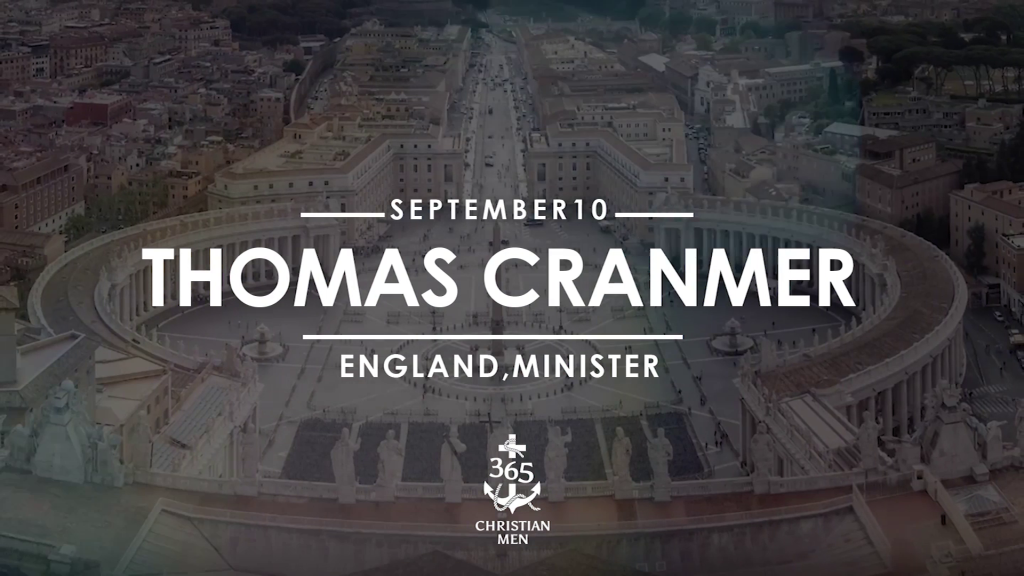September 10. Thomas Cranmer. Cranmer was a leader of the English Reformation, and he was the Archbishop of Canterbury during the reigns of two kings and a queen of England.
Cranmer loved God and was sincere in his beliefs. His story is one of hope for people who sometimes make mistakes. On this date in 1533, Cranmer became godfather to the then-future Queen Elizabeth.
When success gets you slander, stand firm in the truth.
When Cranmer became the Archbishop of Canterbury, he suddenly faced a slew of accusations. People started rumors saying he wasn’t educated enough to be in such a high position in the country and the Church.
One time, in an alehouse in Yorkshire, England, a fellow priest had been gossiping among his neighbors. No doubt enjoying the attention, the ability to make his neighbors laugh, and the pleasure of being “in the know,” the priest claimed that Cranmer had as much education as a gosling.
This was not the land of free speech, and in that time and place that kind of talk landed the gossipy priest in prison. Worse, after eight or nine weeks of punishment, what the priest had said was reported to the Archbishop.
Cranmer didn’t seem at all threatened by the priest’s idle talk, but the Archbishop was eager to put the rumors to rest. He got the priest out of prison, invited the priest to the palace, and offered to let the priest quiz him. The gossipy priest could now get proof of just how ill-educated Cranmer was.
The priest accepted the invitation (it being a time and place one did not turn down the invitation of an Archbishop). He met Cranmer in the garden of Lambeth Palace, where the Archbishop was sitting under a vine, waiting. Right off, brother-to-brother, Cranmer asked why the priest had said such hurtful words about him. The priest, eager for an excuse, admitted it was probably the drink at the alehouse that had caused him to do it.
Cranmer listened with respect. And he allowed that enough drink could loosen many tongues. But now that the priest was there, he could finally learn the truth about how educated Cranmer was. “You may oppose me, to know what learning I have,” Cranmer said. “Begin in grammar if you will, or else in philosophy and other sciences, or divinity.”
But the priest knew he couldn’t question anyone in those areas. “I have no manner of learning in the Latin tongue,” he replied. He knew only English.
Cranmer nodded. There would be no questions in Latin, nor would the priest be quizzing him in such worldly matters. Perhaps a Bible quiz would suffice. Surely, as a priest, he would know the Scriptures, and Cranmer used the opportunity to quiz the priest instead.
Cranmer asked if the priest had read the Bible.
Of course. He was a priest. He nodded. “Yes—that we do daily.” This would not be so bad, the priest thought.
“Who was David’s father?” Cranmer asked.
The priest stood still. “I … cannot surely tell, Your Grace.”
“Who was Solomon’s father?”
The priest answered that he didn’t really look at genealogies.
By this time Cranmer had already proven that his own education wasn’t low or poor. The King wouldn’t have appointed him to be Archbishop if he weren’t prepared.
Cranmer looked to the priest, scolding him gently as a fellow minister, who wanted to make sure his brother learned his lesson. “God amend you,” he said, “and from henceforth, learn to be an honest man, or at least a reasonable man.”
The priest nodded again, and obviously felt very sorry. He had been wrong to spread such a false and hurtful rumor.
The Archbishop sent the priest—not back to prison—but to his home.
“So also the tongue is a small thing, but what enormous damage it can do. A great forest can be set on fire by one tiny spark. And the tongue is a flame of fire. It is full of wickedness, and poisons every part of the body. And the tongue is set on fire by hell itself and can turn our whole lives into a blazing flame of destruction and disaster” (James 3: 5-6 TLB).
Have you ever faced slander or gossip from people who didn’t celebrate your success? How might you deal with words meant to hurt you? When success gets you slander, stand in the truth and find peace.
Mason, Arthur James. Thomas Cranmer. London: Methuen & Co. 1898. Internet Archive. March 19, 2019.
Nichols, John Gough, editor. Narratives of the Days of the Reformation: Chiefly from the Manuscripts of John Foxe the Martyrologist; with Two Contemporary Biographies of Archbishop Cranmer. Westminster: The Camden Society, 1859. Internet Archive. March 19, 2019.
Story read by: Peter R Warren, https://www.peterwarrenministries.com/
Introduction read by: Daniel Carpenter
Audio production: Joel Carpenter
Editor: Teresa Crumpton, https://authorspark.org/
Project manager: Blake Mattocks
© 2020, 365 Christian Men. LLC. All rights reserved.





